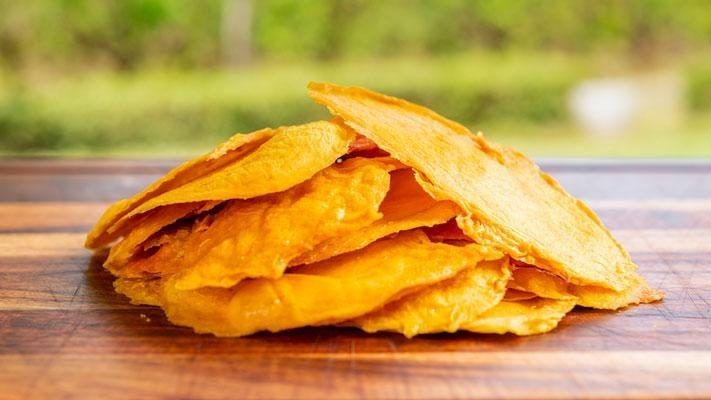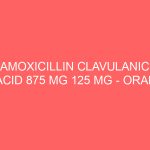
Dried Mangoes: Good or High in Sugar?
Dried mangoes are a chewy, delicious alternative to fresh fruit. They are rich in potassium, fiber, and vitamin C, but they are also high in sugar.
On the other hand, fresh mangoes are packed full of healthy ingredients. So, what about dried mangoes?
Although many dried fruits have high sugar content, they are actually one of the healthiest snack options available. Just choose products without added sugar and stick to recommended daily amounts.
Let’s explore the nutritional components of dried and fresh mangoes.
Mangoes are a tasty stone fruit that grows in many countries around the world.
They come from the tropical evergreen tree, Mangifera indica. This fruit tree has over 1,000 varieties, but only a few are cultivated on a large scale.
When young, mangoes have smooth, green peels. As they ripen, they turn yellow, orange, or red.
Fresh mangoes have a rich, sweet and tart flavor, and this unique flavor profile is maintained in dried mangoes.
What happens to mangoes when they are dried?
Commercially dried mangoes undergo various dehydration processes. These processes remove water, resulting in a tougher, more concentrated fruit. As a result, dried fruit weighs less than fresh fruit.
Drying also concentrates the nutrients and changes the chemical and nutritional properties of mangoes.
How do dried mangoes differ from fresh mangoes nutritionally?
Dried fruit has different nutritional contents compared to fresh fruit, even when considering equivalent amounts. This is because dried fruit is a more concentrated version of the original fruit. However, the dehydration process preserves some nutrients better than others.
Here is a breakdown of the nutrients in 100 grams of raw, fresh mango (F) compared to 100 grams of dried mango (D):
- Water: 83.5 grams in F, 16.6 grams in D
- Protein: 0.82 grams in F, 2.45 grams in D
- Total fat: 0.38 grams in F, 1.18 grams in D
- Carbohydrates: 15 grams in F, 78.6 grams in D
- Fiber: 1.6 grams in F, 2.4 grams in D
- Sugar: 13.7 grams in F, 66.3 grams in D
- Calcium: 11 milligrams in F, 0 milligrams in D
- Iron: 0.16 milligrams in F, 0.23 milligrams in D
- Magnesium: 10 milligrams in F, 20 milligrams in D
- Phosphorus: 14 milligrams in F, 50 milligrams in D
- Potassium: 168 milligrams in F, 279 milligrams in D
- Sodium: 1 milligram in F, 162 milligrams in D
- Zinc: 0.09 milligrams in F, 0.3 milligrams in D
- Copper: 0.111 milligrams in F, 0.3 milligrams in D
- Selenium: 0.6 micrograms in F, 2.1 micrograms in D
- Vitamin C: 36.4 milligrams in F, 42.3 milligrams in D
- Thiamin: 0.028 milligrams in F, 0.062 milligrams in D
- Riboflavin: 0.038 milligrams in F, 0.085 milligrams in D
- Niacin: 0.669 milligrams in F, 2 milligrams in D
- Vitamin B-6: 0.119 milligrams in F, 0.334 milligrams in D
- Folate: 43 micrograms in F, 68 micrograms in D
- Choline: 7.6 milligrams in F, 23.7 micrograms in D
- Vitamin A: 54 micrograms in F, 67 micrograms in D
- Beta carotene: 640 micrograms in F, 786 micrograms in D
- Vitamin E: 0.9 milligrams in F, 4.02 milligrams in D
- Vitamin K: 4.2 micrograms in F, 13.2 micrograms in D
It’s important to note that the exact nutrient content of dried mangoes can vary depending on the variety used.
QUESTION
Do dried mangoes contain too much sugar?
Comparing dried and fresh mangoes, it’s clear that dried mangoes have significantly more sugar. The 100-gram samples have 66.3 grams of sugar compared to the 13.7 grams found in fresh mangoes.
While excessive sugar consumption is generally not recommended, the natural sugars found in fruits like mangoes, such as fructose, are healthier than highly processed sugar additives found in junk food. Interestingly, about 80% of Americans do not consume enough fruit.
What are the benefits of eating mangoes?
Research shows that mangoes are packed with beneficial nutrients, including those that many Americans lack. These nutrients have crucial roles in the body and can reduce the risk of chronic diseases.
Eating dried fruit, like mangoes, can help provide a variety of essential nutrients. Dried fruits are convenient for on-the-go consumption, have a longer shelf life, and contribute positively to nutrient diversity.
Mangoes also contain natural molecules that function as antioxidants, anti-inflammatories, and anti-cancer agents.
While there is still ongoing research on how mangoes specifically impact health, early studies suggest positive effects on blood glucose levels. However, more research is needed to fully understand these effects and determine if dried mangoes provide similar benefits.
How much dried mango should you eat?
According to the USDA, one-third of a cup of dried mango is equivalent to one cup of fresh mango. However, individual fruit consumption depends on factors such as age, weight, height, sex, and daily physical activity.
Generally, daily fruit intake recommendations based on age are as follows:
- 12-to-23-month-olds: half to one cup
- Two-to-four-year-olds: one to one-and-a-half cups
- Five-to-eight-year-olds: one to two cups
- Females nine and older: one-and-a-half to two cups
- Males nine to 60: two to two-and-a-half cups
However, it’s important to consume a variety of fruits and incorporate vegetables, whole grains, and dairy products for a well-balanced diet.
Sources:
– Florida Medical Association: "Healthy Living Toolkit"
– Foods: "Impact of Three Different Dehydration Methods on Nutritional Values and Sensory Quality of Dried Broccoli, Oranges, and Carrots"
– Nutrients: "Mango Consumption Is Associated with Improved Nutrient Intakes, Diet Quality, and Weight-Related Health Outcomes," "Multifaceted Health Benefits of Mangifera indica L. (Mango): The Inestimable Value of Orchards Recently Planted in Sicilian Rural Areas"
– Nutrition and Metabolic Insights: "Acute Freeze-Dried Mango Consumption With a High-Fat Meal has Minimal Effects on Postprandial Metabolism, Inflammation and Antioxidant Enzymes"
– Penn State: "Eating dried fruit may be linked with better diet quality and health markers"
– USDA FoodData Central: "Mango, dried," "Mangos, raw"
– USDA MyPlate: "Fruits"


